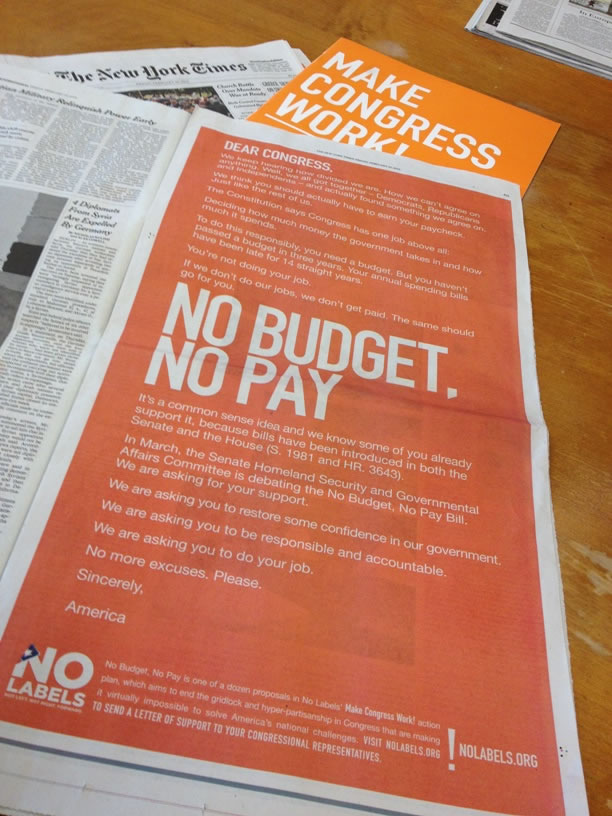No Budget, No Pay, No Labels?

Tomorrow the Senate Homeland Security and Governmental Affairs Committee will hold a hearing on No Labels sponsored "No Budget No Pay Act" (S. 1981/H.R. 3643) in a hearing entitled, “Raising the Bar for Congress: Reform Proposals for the 21st Century.” No Budget No Pay is an attempt to hold members of Congress accountable for their actions by withholding compensation if a budget is not agreed upon. The committee will hear testimony on the legislation as well as other reforms sponsored by the No Labels Make Congress Work ! action plan.
Described by No Labels co-founder, Mark McKinnon, “No Budget, No Pay simply holds members of Congress to the same standards as the American people.” No Labels argues that, “Teachers aren't paid if they don't show up to teach. Nurses aren't paid if they can't care for their patients. If our legislators don't legislate, they shouldn't be paid.” The act currently has 39 co-sponsors in Congress.
Other congressional reforms sponsored by No Labels include filibuster reform, 90 day deadlines to vote on presidential appointments, and monthly bipartisan meetings. Reforms to the current filibuster process are in response to what No Labels sees as a “non-functional” senate that currently allows legislation to be stalled when senators simply signal their intent to filibuster.
No Labels endorses a two-part attempt at a solution to the filibuster problem which includes, requiring real, not virtual, filibusters, and ending filibusters on motions to proceed. No Labels claims, “This proposal requires a change of House and Senate rules, which can be made effective when the new Congress is seated in 2013.”
Reforms to up or down votes on presidential appointments, require that a nomination received by the Senate to be confirmed or rejected within 90 days of it being received. No Labels believes that the “Advise and Consent” power conferred to the Senate over presidential appointments is no longer being used in the way it was intended by the Founders, but is instead creating conflicts of interest.
Finally, No Labels seeks to promote monthly bipartisan gatherings of members of Congress. The purpose of these gatherings would be to promote healthy discussion across party lines. According to No Labels, while “Partisanship has always been and always will be a part of Congress, there was a time when members actually made an effort to build relationships with people from the other party.” They hope to see this proposal imposed by House or Senate leadership.
To see a complete list of congressional reforms sponsored by No Labels, visit their website describing 12 Ways to Make Congress Work!.




